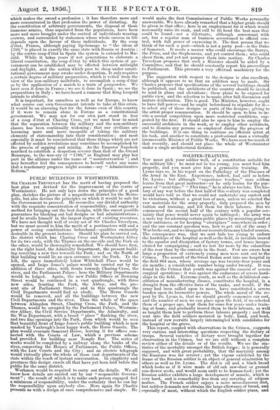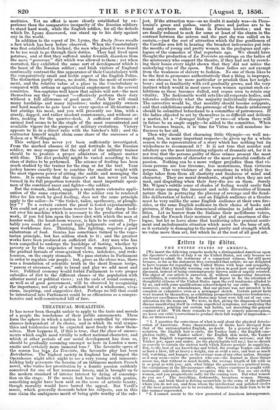SOLDIER-TRAINING.
You must pick your soldier well, of a constitution suitable for the military life ; he must not be too young, you must feed him properly, and you must give him aastic training. Dr. Lyons says so, in his report on the Pathology of the Diseases of the Army in the East. Experience, indeed, had said so before Dr. Lyons ; but although "experience teaches," man seldom learns from that great instructorâor he only learns for the pur- poses of "next time." "TMs time," he is always too late. The his- tory of any war before the first half of this century was completed, would have told us that we could not undertake any contest and be victorious, without a great loss of men, unless we selected the raw materials for the army properly, duly prepared the men by tuition and training, and fed them for their labours. But we commenced the second half of the century with a popular cer- tainty that peace would never again be infringed ; the army was a mere toy for adorning certain public places by mounting guard at their entrances, or for keeping " aborigines " somewhere in order; and the one constant question was, how to get rid of the army I" War broke out, and we dragged our recruits from any kind of sources. The consequence was, that we sent lads too young to endure the hardships of the hospital as well as the field, or invalids inured to the squalor and dissipation of factory towns, and hence incapa- citated for campaigning ; and we lost far more by the calamities of the rear than by the contests in the front. Few are aware how large a proportion of extremely young men were sent out to the Crimea. The assault of the Great Redan sent into one hospital in the field 664 men, whose average age was twenty-four years and six months ; a considerable number being under twenty. It was found in the Crimea that youth was against the success of severe surgical operations ; it was against the endurance of severe hard- ships in the field. Extreme youth, as well as the debilitated con- stitution of manufacturing classes, constitutes the hospital, is a draught from the effective force of the ranks, and would, if the army had been called upon to move, have constituted a severe burden upon its locomotive powers. The whole moral of the re- port by Dr. Lyons is, that we should greatly economize our cost, and the number of men we can place upon the field, if we selected them of a proper age, kept them for some few years under train- ing at home, and gradually inured them to their labours, as well as taught them how to perform those labours properly ; and. thus sent into the field soldiers matured in body, hand, and head, instead of raw recruits largely intermingled with candidates for the hospital or the grave. This report, coupled with observations in the Crimea, suggests very curious and interesting questions respecting the dietary of troops. Several varieties of dietary were brought together for observation in the Crimea, but we are still without a complete review either of the details or of the results. We see the sta- tistics of the mortality amongst the British fors; it is generally supposed, and with great probability, that the mortality among the Russians was far severer ; yet the vigour exhibited by the frame of the Russian soldier is an object of general admiration by others as well as Dr. Lyons. The diet is oil and a black bread which looks as if it were made of old oak saw-dust or ground. sun-flower seeds, and would seem unfit to be human food ; yet the Russian soldier exhibits a large development of muscle, which is very hard, and is remarkably free from any covering of adipose matter. The French soldier enjoys a more miscellaneous diet, but neither demands nor obtains the large allowance of bread, and especially of meat, without which the English soldier pines, and
mutinies. Yet no effect is more clearly established by ex- perience than the comparative incapacity of the Russian soldiery to stand hard work, while the English soldier, for all the defects which Dr. Lyons discovered, can stand up to his duty against any in the world.
In addition to the report of Dr. Lyons, the Daily News recalls a fact which has been before observed. When the Constabulary was first established in Ireland, the men who joined it were found to be too weak to go through their duties. They had lived upon potatoes, and at first they suffered under feverish disorders from the more " generous " diet which was allowed to them ; yet when recruited, they exhibited the same sort of development which is the boast of the Russian soldier ; and Irish visitors of England continually contrast the fine appearance of their Constabulary with the comparatively small and feeble aspect of the English Police. The distinction partly arises, no doubt, from the mode of recruit- ment, and the relative value of a place in the Constabulary as compared with artisan or agricultural employment in the several countries. Sea-captains well know that sailors will notâthe men themselves say they "cannot "âeffectively perform their duty without a full allowance of good meat. Jack Tar will stand many hardships and many injustices; under niggardly owners and hard masters he gets used to every species of ill-treatment ; but abridge his meat, and you will presently see him, with a sturdy, dogged, and rather insolent countenance, and without or- ders, making for the quarter-deck. A sufficient allowance of animal food seems to be the staple of the most concentrated and available vigour for the purpose of military evolutions. Victory appears to be in a direct ratio with the butcher's bill ; and the contractor himself might claim some share of the successes of a Nelson or a Wellington.
This subject has never yet been sufficiently investigated. From the marked absence of fat and fortitude in the Russian soldier, we may suppose that the object of the military trainer should be to produce a proper admixture of adipose matter with fibre. The diet probably might be varied according to the class of duties to be performed. The science of feeding has been much studied by the trainer for the ring or for the turf. Your jockey knows exactly how to combine the smallest weight with the most vigorous power of sitting the saddle and managing the horse. It is curious that the trainer's art has never yet been turned in its full proportion towards that most important speci- men of the combined racer and fighterâthe soldier.
But the remark, indeed, suggests a much more extensive appli- cation of the same experiment. If the soldier can be rendered fitter for his work by good feeding, does not the same principle apply to the sailorâto "the tinker, tailor, apothecary, or plough- boy" ? To a certain extent the proof is tested experimentally. You could not get a power-loom weaver to keep the sharp look- out over his machine which is necessary to the production of the work, if you fed him upon the lower diet with which the man at harder work, the hand-loom weaver, is fain to be content. Pro- bably you could not get sound legal judgments out of a judge upon workhouse fare. Thinking, like fighting, requires a good substratum of food. Genius has sometimes turned to the vege- tarian principle, but has seldom stuck to it ; and the greatest works have been produced on sufficient diet. Any man who has been compelled to undergo the hardships of fasting, whether by poverty or by the exigencies of travel in remote places, knows the gradual inroads of cross-grained views, indolence, and reck- lessness, on the empty stomach. We pass statutes in Parliament in order to regulate our people ; but, gross as the abuse was, there was a foundation of scientific truth in the short Roman recipe, " panem et cireenses," only to bread and play we add meat and beer. Political economy would forbid Parliament to vote proper subsidies of diet to the different classes of the population with ulterior moral or political views ; yet the ends of sound economy-, as well as of good government, will be observed by recognizing the importance, not only of a sufficient but of a wholesome, viva- cious, inspiring, and suggestive diet. Perhaps no bill that could be introduced into Parliament could be so efficacious as a compre- hensive and well-constructed bill of fare.



































 Previous page
Previous page